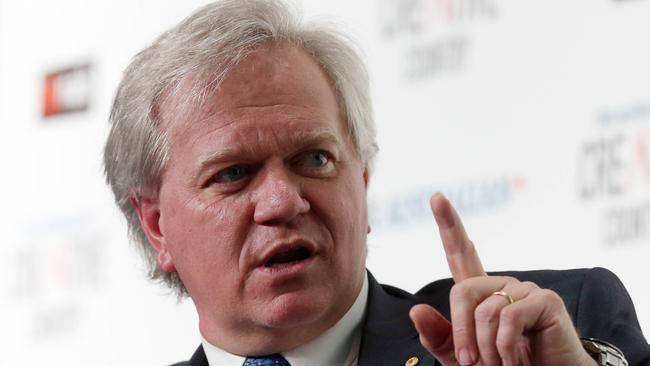
Anyone who has funded programs at the Australian National University, as I have, knows that the university has many ways of safeguarding its academic integrity while meeting the objectives of external funders.
And anyone who has followed the negotiations between the ANU and the Ramsay Centre for Western Civilisation knows the draft agreement, which was virtually concluded, left final decision-making authority to the university, thus more than complying with the university’s policies.
The claims of ANU vice-chancellor Brian Schmidt that the agreement would have undermined the university’s “autonomy” are simply incorrect.
Rather, it is obvious that the problems stemmed not from the agreement itself but from the objections of the National Tertiary Education Union and the ANU students association to the university having any relationship with the Ramsay Centre, quite regardless of its terms.
The protesters’ aim, one presumes, was to prove they could bar from university campuses an entity chaired by John Howard and that has — horror of horrors — Tony Abbott on its board.
Their pretext, however, was the contention, advanced by the president of the students’ association, that Western civilisation was “often used as a rhetorical tool to continue the racist prioritisation of Western history over other cultures”, with the NTEU branch president adding that the funding would have advanced “a narrow, radically conservative program to demonstrate and promulgate the alleged superiority of Western culture and civilisation”.
That those claims were made is unsurprising. What is astonishing is that Schmidt made no effort to rebut them.
That would hardly have been difficult. Yes, references to Western civilisation have at times been used to justify racism and even genocide. But it is every bit as true that the Western canon contains the most powerful rebuttals of racism ever written and provides a uniquely far-reaching affirmation of human dignity and equality.
Who, for example, more effectively scorned Europe’s presumed superiority than Michel de Montaigne, one of the French Renaissance’s most significant philosophers, when he compared the cannibalism of the alleged “savages” who dismembered their victims when they were dead to the savagery of his compatriots who — in the name of extirpating heresy — tore their victims apart while they were alive?
As for imperialism, who more effectively challenged the colonisers than Adam Smith when he denounced the European countries’ “plunder” of Asia and Africa as being every bit as “destructive to those who have the misfortune to fall under their government” as it was inimical to the colonisers’ own freedom and morality; and Edmund Burke, who incessantly pounded Britain’s “systematick iniquity and despotic oppression” of colonial peoples?
And how is it possible to even think about genocide without drawing on Hannah Arendt, whose work is so firmly rooted in the classical tradition as to be incomprehensible outside it?
None of that denigrates other cultures. But it is surely no coincidence that the pioneers of freedom in the non-Western world were not only the Western canon’s most devoted admirers but also among its finest translators, including Namik Kemal, the great Ottoman constitutionalist; Ram Mohan Roy, whose “Bengal Renaissance” set the intellectual foundations for Indian independence; and Yan Fu in Qing China, who magnificently translated the writings of Montesquieu and Adam Smith.
However, it is not just the enduring universalism of its concepts and conceptions that makes it crucial for young Australians to engage with the Western canon. It is also the fact there is no better way to master what the ancient Greeks called phronesis, or practical reason — the deeply anchored, acquired habit of thinking well in order to act well.
As today’s students prepare for a future in which technological change will continuously reshape their careers and aspirations, it is that ability to reason that they desperately need, not vocational skills that risk being obsolete even before they have been fully learned.
Ultimately, however, we nurture our culture — a term that derives from the Latin word colere, which means to cultivate, protect and preserve — not because it teaches us to earn a living but because it teaches us how to live. After all, in a world mainly governed by bluffing amateurs and shortsighted opportunists, how better to confront the dilemmas of ethics than by grappling with the decision, immortalised in Sophocles’s tragedy, that Agamemnon faced when he gave the slain Achilles’s armour not to Ajax, bravest of the Greeks, but to Odysseus, who was the wiliest?
And how better to understand what it means to cherish life, and yet above all else value freedom, than by reading and rereading Pasternak and Solzhenitsyn, Mandelstam and Akhmatova?
That is why Stalin shot poets. It is why Hermann Goering said that “whenever I hear ‘culture’ I reach for my revolver”.
And it is why Arendt, writing in the shadow of the Holocaust, argued that our cultural heritage shines through when behaviour cannot be governed by “the usual rules” but “by whether I shall be able to live with myself when the time has come to think about my deeds and words”.
At those moments in life when the chips are down, she concluded in a text that resonates through the decades, “the manifestation of the wind of thought is not knowledge: it is the ability to tell right from wrong”.
The ANU was offered the chance to help young Australians acquire that priceless gift, including through generous scholarships. But that would have required a measure of courage — as genuine intellectual inquiry always has.
Immanuel Kant starkly set that out more than two centuries ago. “What is enlightenment?” Kant asked. “It is,” he answered, “daring to know.”
The ANU chose cowardice instead.
By doing so, it impoverished itself, its students and the nation whose name it claims as its own.






